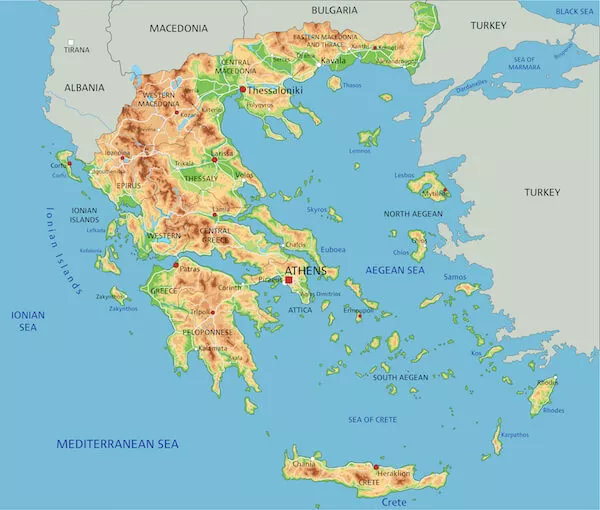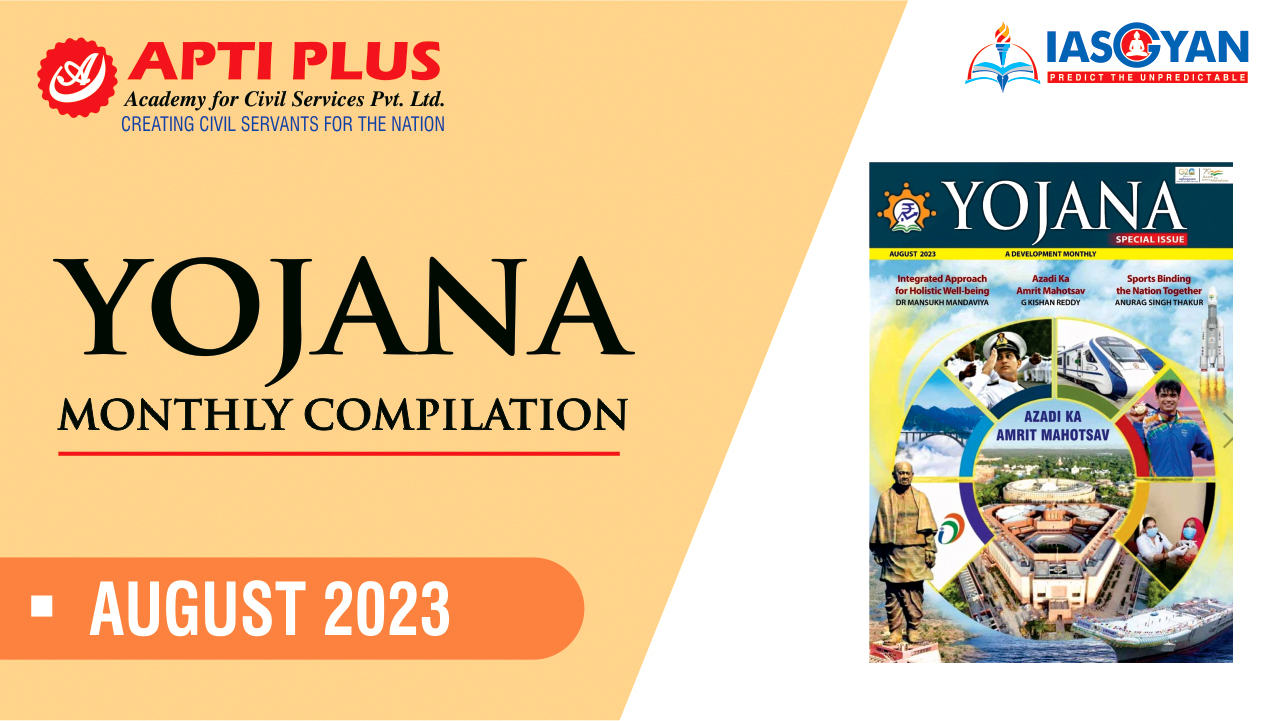PERSPECTIVE: PM Modi In Greece

Disclaimer: Copyright infringement not intended.
Context
- Prime Minister Narendra Modi landed in the Greek capital, Athens, for a one-day visit, marking the first visit of an Indian Prime Minister to Greece in 40 years.
Details:
- PM Modi arrived in Athens - the Greek capital - from South Africa where he attended the 15th BRICS Summit and held bilateral meetings with several world leaders to further cement India's relations with those countries.
- As Prime Minister Modi arrived in the Greek capital of Athens, he was warmly greeted by the Indian community residing in Greece.
- A symbolic gesture of cultural exchange was presented as they gifted him with a traditional Greek headdress, symbolizing the bridging of cultures and the strong ties that the two nations share.

INTRODUCTION:
| On this occasion, the Greek President Katerina Sakellaropoulou conferred the Prime Minister(PM) of India with “The Grand Cross of the Order of Honour”. The Indian PM paid tribute at the ‘Tomb of Unknown Soldier’ in Athens. |
- India-Greece relations refer to the diplomatic, economic, cultural, and historical ties between the Republic of India and the Hellenic Republic (Greece).
- India and Greece share a rich historical and cultural heritage. The two leaders are expected to discuss initiatives to promote cultural exchanges, fostering a deeper understanding and appreciation of each other’s cultures.
- The Indian diaspora in Greece is a significant bridge between the two countries. The leaders are likely to discuss measures to strengthen the bond with the diaspora community and promote their contributions to both nations.
|
Greece is one of the oldest civilizations in the world and is considered the cradle of Western civilization. It is the birthplace of democracy, philosophy, theater, and the Olympic Games.
Greece is a country in southern Europe with a long coastline on the Mediterranean Sea. It is bordered by Albania, North Macedonia, Bulgaria, and Turkey.
|

Historical and Cultural Ties:
Ancient Connections:
- India and Greece have historical ties dating back to ancient times when they were both part of the expansive trade routes of the Silk Road.
- The interaction between the two civilizations is evident in the accounts of Greek historians like Megasthenes, who documented their observations about India.
Buddhism:
- The most prominent historical connection between India and Greece is the influence of Buddhism.
- After the conquests of Alexander the Great in the 4th century BCE, Greek emissaries, including the famous Mauryan ambassador Megasthenes, resided in India.
- The interaction facilitated cultural exchange, and Greek art and culture had an impact on the Indian subcontinent.
Cultural Exchanges:
- Indo-Greek cultural exchanges led to the fusion of Greek and Indian art, known as Greco-Buddhist art. Statues, coins, and other artifacts from this period reflect this synthesis of influences.
.jpg)
Present relations between India and Greece:
Diplomatic Relations:
Modern Diplomacy:
- Modern Indo-Greek diplomatic relations have evolved significantly. Both countries maintain embassies in each other's capitals. India's embassy in Athens and Greece's embassy in New Delhi facilitate diplomatic interactions.
- Greece has extended full support to India’s quest for a Permanent Seat in an expanded UNSC (co-sponsored the G-4 Resolution and voted in favour of our successful bid for the non-Permanent UNSC Seat, 2011-12).
- It supported India at the Nuclear Suppliers’ Group in 2008, and 2016, MTCR, WASSENAAR arrangements, and Australia Group.
- Greece also supported India’s candidature for ICJ, ITLOS, IMO, and various other international bodies.
- On J&K, its position reflects our concerns. It strongly condemned the Mumbai terrorist attacks.
Bilateral Visits:
- High-level visits between the two countries have taken place over the years. For example, Greek President Prokopis Pavlopoulos visited India in 2018, highlighting the commitment to strengthening bilateral ties.
Agreements and MOUs:
- Greece and India have signed the following agreements:
- Agreements on Avoidance of Double Taxation (1967),
- Economic, Scientific and Technical Cooperation in 1983,
- on Cultural Relations in 1961 which resulted in several Cultural Exchange Programmes (CEPs),
- on Tourism in 1998,
- on Defence Cooperation in 1998, and
- An MoU on Agricultural Cooperation in 2001.
- On Science & Technology and on Bilateral Investment Promotion & Protection (BIPA) in 2007.
- In February 2013, an agreement on visa-free travel for diplomatic passport holders.
- In 2017, the Air Services Agreement and MoU on Cooperation in the field of New and Renewable Energy were signed, which were ratified by the Greek parliament on 15 March 2022.
Trade and Economic Relations:
Bilateral Trade:
- Bilateral trade between India and Greece has been growing steadily. India primarily imports refined petroleum and pharmaceutical products from Greece, while India exports products like organic chemicals and machinery.
- The bilateral merchandise trade stood at about USD 2 billion in 2022-23.
- India was the ‘honoured’ country at the 84th Thessaloniki International Fair in 2019, the largest annual commercial exposition in South-Eastern Europe.
- The economic and commercial relations between the two countries continue to grow and can certainly receive a new dynamic in the near future.
Investment:
- Indian companies have made investments in Greece, particularly in sectors like information technology and renewable energy. These investments contribute to economic cooperation and job creation in both countries.
- Recently, India and Greece elevated their ties to the level of strategic partnership, vowed to double bilateral trade by 2030 and agreed to firm up a migration and mobility pact soon.
- The main items of Greece’s exports to India are machinery, rubber and plastic products, cotton, copper products, iron and steel products and chemicals.
- The main items of India’s exports are machinery, automobiles and auto parts, iron and steel, aluminium, copper, dyes and chemicals, and textiles and garments.
Cultural and Educational Exchanges:
Academic Collaborations:
- Academic institutions and universities in India and Greece have fostered collaborations in fields like archaeology, history, and cultural studies. These exchanges contribute to a deeper understanding of each other's cultures.
Cultural Festivals:
- Cultural events and festivals are organized by both countries to promote mutual understanding and appreciation of each other's cultural heritage. These events showcase dance, music, and art forms from India and Greece.
Tourism:
Tourist Arrivals:
- Tourism plays a vital role in strengthening people-to-people ties between India and Greece. Both countries attract tourists from each other, with Indians visiting Greece for its historical sites and natural beauty, while Greeks visit India to explore its diverse culture and heritage.
Tourism Promotion:
- Initiatives to promote tourism, such as tourism fairs, have been organized to encourage travel between the two countries.
Diaspora Communities:
Indian Diaspora in Greece:
- India has a significant diaspora community in Greece, which includes professionals, students, and businesspeople. They contribute to the socio-economic and cultural fabric of Greece.
Greek Diaspora in India:
- Similarly, there is a small Greek community in India. While not as large as the Indian diaspora in Greece, they also contribute to cultural diversity and exchange.
Diplomatic Collaboration:
Multilateral Forums:
- India and Greece collaborate on various international and multilateral forums, including the United Nations and climate change conferences. They often share common perspectives on global issues.
- At the diplomatic level, India and Greece can support each other on issues of mutual interest. Greece can offer its support for the Free and Open Indo-Pacific (FOIP) initiative to promote peace, stability and freedom of navigation in the Pacific Ocean.
- Greece is a seafaring nation and it currently hosts one of the greatest merchant fleets globally thus its vital interests are structurally intertwined with freedom of movement in the seas. This is a common ground with India, a leading power in the Indo-Pacific region.
Significance of Indo-Greek Relationships:
Heritage and Influence:
- The ancient interactions between Greek and Indian cultures have left a lasting imprint on both civilizations. The Greco-Buddhist art and the spread of Buddhism in the Hellenistic world are examples of this historical connection.
Shared Philosophical Traditions:
- Both India and Greece have rich philosophical traditions. The exchange of ideas between Greek philosophers like Pythagoras and Indian philosophers like those from the Upanishadic and Buddhist traditions has contributed to the development of philosophical thought.
Multilateral Forums:
- India and Greece often collaborate in international organizations and forums such as the United Nations. Their shared commitment to principles like democracy, peace, and international law strengthens their diplomatic ties and influence on global issues.
Counterterrorism and Security:
- Both countries share concerns about terrorism and regional security challenges. Collaborative efforts in intelligence sharing, counterterrorism, and maritime security are significant for the stability of the Indo-Pacific region and the Eastern Mediterranean.
Regional and Global Dynamics:
- India's strategic location in South Asia and Greece's location in Southeast Europe make them important players in their respective regions. Enhanced cooperation can influence regional dynamics and contribute to global stability.
Counterbalance to Regional Powers:
- Collaboration between India and Greece can help balance the influence of larger regional powers in their respective regions. This can be particularly important in addressing regional challenges and promoting regional stability.

Challenges in relationships:
Geographical Distance:
- India and Greece are geographically distant from each other, which can pose logistical challenges for regular high-level interactions and trade relations. The physical distance can also result in longer transit times for goods and increased transportation costs.
Limited Economic Engagement:
- Despite the potential for economic cooperation, the volume of bilateral trade and investment between India and Greece has historically been modest. Expanding economic ties requires overcoming barriers such as regulatory differences, market access issues, and limited awareness of business opportunities.
Historical and Cultural Differences:
- While historical and cultural connections exist, there are also significant differences in historical experiences, languages, and cultural practices between the two countries. Bridging these differences and fostering a deeper mutual understanding can be a challenge.
Divergent Regional Priorities:
- India's primary focus is often on its immediate neighborhood and the broader Indo-Pacific region, while Greece's primary concerns often revolve around the Eastern Mediterranean and the European Union. Balancing these divergent regional priorities can be challenging in terms of aligning strategic interests.
Complex Regional Dynamics:
- Both India and Greece are located in regions with complex geopolitical dynamics. Greece, for example, faces challenges related to tensions in the Eastern Mediterranean, while India grapples with its own regional security issues. These dynamics can affect their diplomatic and security cooperation.
Language Barrier:
- While English is widely spoken and understood in both countries, language barriers can still pose challenges in certain areas of interaction, especially in cultural and educational exchanges.
Conclusion
- Greece and India are a natural match between two ancient civilisations of the world, between two ancient democratic ideologies and between two ancient trade and cultural relations.
- Today, India is the core state of Asia and a global power, while Greece is an essential partner in the Mediterranean Sea and a member of both NATO and the EU.
- The two countries can deepen their cooperation in various fields by building on their military and diplomatic synergies.
- The strategic alignment of India and Greece in the new geopolitical environment would cater to the national interests of both countries.
CITATIONS:
https://www.google.com/url?sa=i&url=https%3A%2F%2Fwww.idsa.in%2Fidsacomments%2Frelations-between-india-and-greece-ie-kotoulas-070422&psig=AOvVaw0MrLboU7kJ_DUqV1nfSYpL&ust=1695306546368000&source=images&cd=vfe&opi=89978449&ved=0CBIQjhxqFwoTCOjruZSzuYEDFQAAAAAdAAAAABAa
https://www.google.com/url?sa=i&url=https%3A%2F%2Fwww.theweek.in%2Fnews%2Fworld%2F2021%2F01%2F27%2Findian-greek-ties-have-exciting-prospects-built-on-the-legacy-of-alexander-the-great-king-porus.html&psig=AOvVaw0MrLboU7kJ_DUqV1nfSYpL&ust=1695306546368000&source=images&cd=vfe&opi=89978449&ved=0CAUQtaYDahcKEwjo67mUs7mBAxUAAAAAHQAAAAAQHw
https://www.thestatesman.com/world/india-greece-elevate-ties-to-strategic-partnership-2-1503215679.html#:~:text=%E2%80%9CGreece%20and%20India%20are
https://www.thehindu.com/news/national/pm-modi-arrives-in-greece-on-first-prime-ministerial-visit-in-40-years/article67233920.ece
https://sansadtv.nic.in/corners/joint-press-statement-by-pm-modi-with-greek-pm-kyriakos-mitsotakis-25-august-2023






